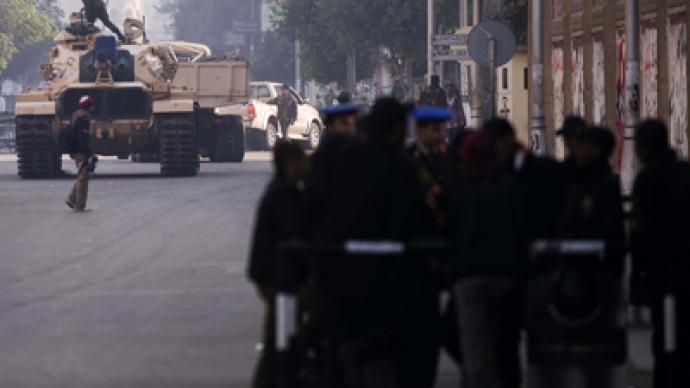Egyptian President Mohamed Morsi will authorize the deployment of the country's armed forces to quash protests in Cairo, al-Ahram reported. The military said prolonging the crisis would be "disastrous,” and that they would not tolerate violence.
At least six people died and hundreds were reported injured over the last few days in the unrest that has gripped the Egyptian capital since late November.Al-Ahram reported that the armed forces will be given powers of arrest, previously an exclusive right of the police. The decree, which has yet to be signed by President Morsi, is part of legal measures the cabinet approved to help security forces maintain order.A spokesperson from the Egyptian military stated that the army will not allow the violence to continue, and that the military will follow "its national responsibility in protecting the nation's higher interests'' and state institutions."Anything other than [dialogue] will force us into a dark tunnel with disastrous consequences; something which we won't allow,'' the military said in a statement read on state television.The presidential palace in Cairo, which has become the focal point of the recent protests, is again surrounded by barbed wire fences and concrete barricades. Police, soldiers and Republican Guards backed by tanks continue to patrol the perimeter.
Thousands of Egyptians have flocked to the palace over the last few days to protest Morsi’s recent decree granting his office vastly expanded powers. The country's opposition fears that the decree may usher in totalitarian rule.In addition to Morsi’s new powers, demonstrators also railed against a draft constitution pushed through last week by the Islamist majority Constituent Assembly. Critics have voiced concerns that the Sharia-based legislation will have a detrimental effect on freedom of speech and women’s rights in Egypt. In an attempt to curb the opposition, the Muslim Brotherhood called on thousands of supporters to march in Cairo to show solidarity with President Morsi. On Wednesday night, clashes between the two political camps grew deadly, and resulted in tanks being deployed in the capital and a curfew being imposed.
Political stalemate
President Morsi and opposition groups – including leftist, democratic and liberal factions – have been trading blame for the recent violence in the capital and across the country after several Muslim Brotherhood headquarters came under attacks. In an effort to quell the protests, Morsi has offered to delay the referendum vote on the draft constitution, originally set for December 15, and urged for a national dialogue.This call was reinforced by the Muslim Brotherhood’s leaders Saturday, who also urged the nation to rule the country “by ballot boxes.” "The Muslim Brotherhood has adopted dialogue as the only way to deal with all opposition. But what is happening is not the opposition, it is not a difference of opinion, but corruption and criminality," Brotherhood supreme guide Mohammed Badie said.Brotherhood leader Khairat Shater also said the movement is “prepared to protect [Morsi’s] legitimacy,” and blamed the “remnants of the previous regime” for its attempts to “disrupt the new regime in Egypt,” Al-Arabiya reported.Badie’s and Shater's remarks came ahead of a meeting Morsi had called with his opponents to discuss the crisis. Around 50 people turned up for the crisis talks, with most of the opposition groups skipping the meeting. This included the National Salvation Front, the main opposition body led by former presidential candidates Mohamed El Baradei, Hamdeen Sabbahi and Amr Moussa. Later in the day the NSF once again rejected the consitutional referendum and accused Morsi of seeking to gain time as quoted by Al-Arabiya.Those in attendance represented several Salafist and Islamist movements, there also were several religiuos leaders and the press. It is not yet known if the meeting yielded any agreements, reports Ahram Online.The opposition has roundly rejected the call for negotiations, saying the president must first cancel the referendum and rescind his recent decrees. The only group that has so far agreed to talks is the liberal Ghad Al-Thawra Party.

